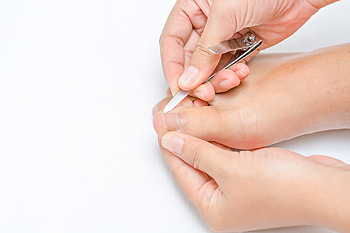
Ingrown toenails are a common condition in which the corner or side of a toenail grows into the soft flesh. The result is pain, inflamed skin, swelling and, sometimes, an infection. Ingrown toenails, which most commonly affect the big toe, can be painful and frustrating, but the good news is that there are several effective treatment options available to alleviate the discomfort and promote healing. Ingrown toenails often result from improper nail care, wearing tight-fitting shoes, or trauma to the toe. Cutting your nails too short or rounding the edges instead of trimming them straight across can also increase the risk. Find shoes that have a wider toe box, to avoid having the toes squeezed too tightly. If ingrown toenails develop frequently, custom orthotic devices also can help redistribute pressure on the toes. A podiatrist may prescribe antibiotics to treat or prevent infection. In more severe cases, a podiatrist may need to remove a portion of the ingrown toenail to promote healthy nail growth. If you are suffering from the pain of an ingrown toenail, it is suggested that you make an appointment with a podiatrist for proper diagnosis and treatment.
Ingrown toenails may initially present themselves as a minor discomfort, but they may progress into an infection in the skin without proper treatment. For more information about ingrown toenails, contact Donald Manger, DPM of Associated Podiatric Physicians, PA. Our doctor can provide the care you need to keep you pain-free and on your feet.
Ingrown Toenails
Ingrown toenails are caused when the corner or side of a toenail grows into the soft flesh surrounding it. They often result in redness, swelling, pain, and in some cases, infection. This condition typically affects the big toe and may recur if it is not treated properly.
Causes
- Improper toenail trimming
- Genetics
- Improper shoe fitting
- Injury from pedicures or nail picking
- Abnormal gait
- Poor hygiene
You are more likely to develop an ingrown toenail if you are obese, have diabetes, arthritis, or have any fungal infection in your nails. Additionally, people who have foot or toe deformities are at a higher risk of developing an ingrown toenail.
Symptoms
Some symptoms of ingrown toenails are redness, swelling, and pain. In rare cases, there may be a yellowish drainage coming from the nail.
Treatment
Ignoring an ingrown toenail can have serious complications. Infections of the nail border can progress to a deeper soft-tissue infection, which can then turn into a bone infection. You should always speak with your podiatrist if you suspect you have an ingrown toenail, especially if you have diabetes or poor circulation.
If you have any questions, please feel free to contact our office located in Hamilton Township, NJ . We offer the newest diagnostic and treatment technologies for all your foot care needs.
